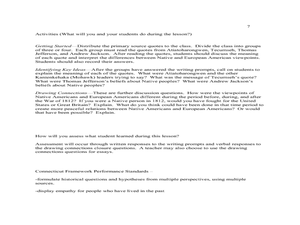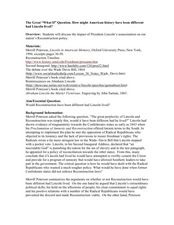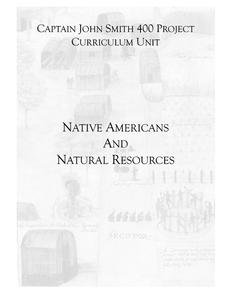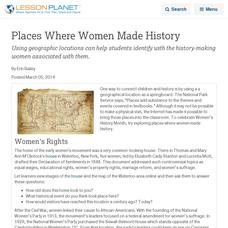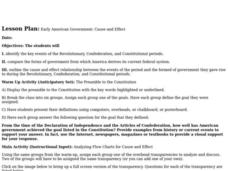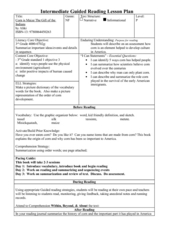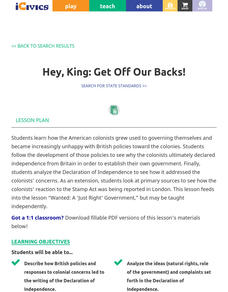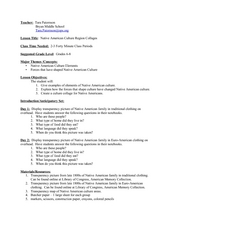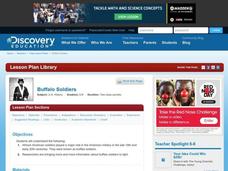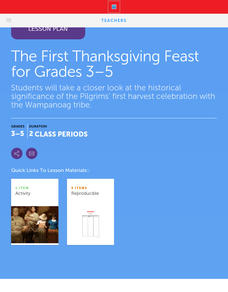Curated OER
Putting It All Together: Early American History 1776-1812
Students view the reverse side of state quarters of those states that entered the union before 1812 and make predictions about what the symbols mean to each state. They complete a worksheet during a lecture describing the symbols and use...
Curated OER
Modern Interpretations
To conclude an eight-lesson study of the events that occurred in the early colonial period in Deerfield, Massachussetss, class members evaluate the point of view and bias found in late 19th and early 20th century retellings.
Curated OER
African American Women Trailblazers
Students take a closer look at the accomplishments of African-American women. In this African-American history lesson, students explore the work of Bessie Coleman, Gwendolyn Bennett, Lulu Madison White, and Zelma Watson George as they...
Curated OER
Interpreting Quotes From Native Americans and European Americans
Students examine the relations between Native Americans and European Americans in the late 1700's and early 1800's. In this Native American history instructional activity, students read and analyze quotes from Atiatoharongwen, Tecumseh,...
Curated OER
The Great "What If" Question. How might American history have been different had Lincoln lived?
Eleventh graders study the Presidency of Abraham Lincoln. In this American History lesson, 11th graders analyze documents related to Reconstruction. Students participate in a debate on Reconstruction.
Curated OER
Native Americans and Natural Resources
North American Indian civilizations had already been in place for over 10,000 years before the arrival of European settlers. Introduce your young historians to Indian tribes that lived in the Chesapeake region in the early seventeenth...
Curated OER
Places Where Women Made History
Using places can help students identify with the history-making women associated with them.
Curated OER
The War of 1812
Seventh graders investigate the War of 1812. In this early American history lesson, 7th graders read a handout about the war, watch video clips, and complete written exercises that complement the reading and video clips.
Curated OER
Curriculum Guide For Teaching Texas History
Follow Texas history from Native Americans all the way to the 21st Century. Teachers analyze the creation of a year-long course on Texas history and use a wide range of teaching subjects and materials to guide them through the state's...
NET Foundation for Television
1850-1874 Native Americans and Settlers
Did Western settlers receiving free land from the Homestead Act realize it wasn't really free at all? Scholars investigate the impact Western expansion had on Native American culture in the mid-1800s. They use documents, timelines, and...
Curated OER
The Figure of Paul Revere. Romanticizing Colonial American History
Pupils compare paintings to make conclusions about American History in the Revolutionary War time period. Students share opinions concerning visual art. Other artwork can be used to entice inquiry as needed.
Curated OER
The Embodied Presidency
Eighth graders discover details about Thomas Jefferson's life. In this early American history instructional activity, 8th graders view a PowerPoint presentation that outlines some aspects of Jefferson's life. Students research the life...
Curated OER
Early American Government: Cause and Effect
Young scholars explore cause and effect. In this early American government lesson, students research the series of events that led to the revolution, confederation, and constitution. Young scholars use cause and effect examples to...
Smithsonian Institution
The Birth of an Icon: Learning and Performing the Origins of the Drum Set and Early Jazz Drumming in New Orleans, Louisiana
Bass drum, snare drum, tom-toms, cymbals. Perched behind their drum sets, wielding their drum sticks and wire brushes, drummers lay the grove and are the heartbeat of a band's performance. A dynamic lesson introduces young musicians to...
Curated OER
Intermediate Guided Reading Lesson Plan for: Corn is Maize The Gift of the Indians
A lovely guided reading lesson awaits you and your students. They read the book,Corn is Maize: The Gift of the Indians, by Aliki, summarize the important events of the story, and describe how corn has helped develop culture in America.
iCivics
Hey, King: Get Off Our Backs!
Young historians explore the reason American colonists were unhappy under British rule. Class members complete hands-on activities and participate in a group discussions to understand why colonists drafted the Declaration of Independence.
NPR
Progressive Era Lesson Plan
The women working for equal rights in the early 20th century weren't a part of one large group; rather, they were members of dozens of small groups focused on social reform. Explore the ways groups in the Progressive Era like National...
Curated OER
Native American Culture Region Collages
Young scholars research various Native American tribes. In this Native American history lesson, students follow the provided rubric to create collages on the cultures of selected Native American tribes.
Curated OER
1704 Attack on Deerfield
Class groups examine conflicting primary and secondary sources describing the 1704 attack on the fort at Deerfield by French and Native Americans and analyze the implications of discrepancies.
Benjamin Franklin Tercentenary
What Good May I Do: Franklin and the American Civic Association
Benjamin Franklin may have been a Founding Father of the United States, but he also founded a number of civic associations. Learners explore his legacy using a biographical essay and collaborative activity. After their exploration,...
Curated OER
Buffalo Soldiers
Students investigate the role of the buffalo soldiers. In this African American history instructional activity, students research the African American soldiers of the 19th and 20th centuries. Students discuss their findings and compose...
Smithsonian Institution
Who's in Camp?
Pupils complete readings, a group activity using cards, and a writing activity to better understand people's lives during the American Revolution. The resource emphasizes people such as the militiamen, women, officers, and children,...
Scholastic
The First Thanksgiving Feast for Grades 3-5
Scholars examine the first Thanksgiving through books and interviews while they complete a KWL chart. Pretending they are part of the feast, learners craft a scrapbook page that features images related to their experience. Pupils reflect...
Roy Rosenzweig Center for History and New Media
George Washington: General, President, Slave Owner
Times change; behaviors that were once considered acceptable can be seen in a very different light. Middle schoolers revisit the legacy of George Washington in a three-day lesson plan that uses primary sources to reveal Washington as a...





